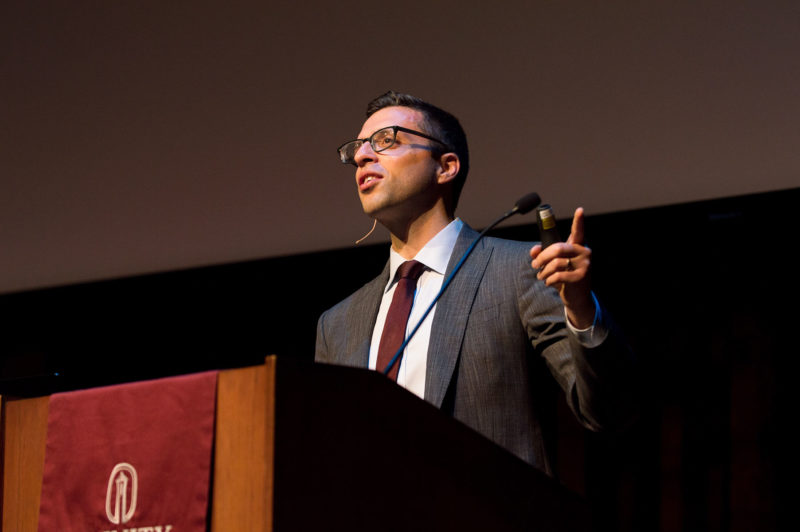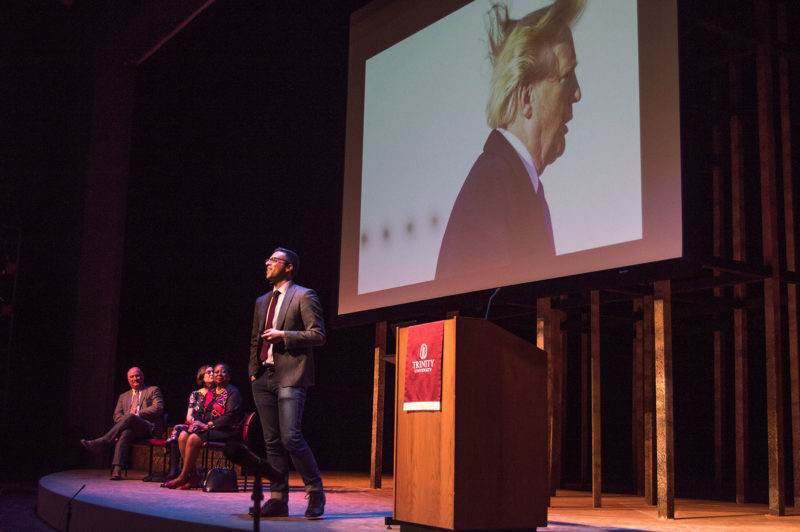The Stieren Theatre overflowed with people and excitement on Nov. 13 as students, faculty and alumni filed into their seats to listen to Ezra Klein speak as the annual Maverick lecturer. Klein is a journalist and the founder of Vox, a news website. Many people were turned away once the theatre hit its capacity; luckily, the event was livestreamed for those who weren’t able to score a seat.
During the lecture, Klein gave insights into what happened during the 2016 presidential election and the current political climate in the United States. He began his lecture by quoting Julia Azari, a political science professor at Marquette University who writes for Vox: “The defining characteristic of our moment is that parties are weak while partisanship is strong.” This summed up much of what Klein covered in his talk.
“You’ve probably heard a lot of commentary about how unusual the 2016 election was,” Klein said in the lecture. “Donald Trump was so unpopular; Hillary Clinton was so unpopular. The whole thing felt bizarre. What I want to do is persuade you that the 2016 election was perfectly normal.”
Klein then compared exit polls from the 2012 presidential election and from the 2016 presidential election, showing their staggering similarities.
Dozie Nwaneri, junior political science major, attended the Klein lecture for a few reasons and found the talk to be very interesting.
“I always like to learn more and I can’t have an opinion on these kind of things without learning from and listening to people who actually have a very solid understanding of what’s going on,” Nwaneri said. “I read his articles online and see his videos, so it’s cool to see him in person. One of the most interesting things was when he talked about how normal the election actually looked, but actually experiencing the election and being part of it was hectic and crazy. All the numbers seemed normal like any other election, so that definitely hit me.”
Elizabeth Cave, a Trinity alumna who graduated in 2004, was also in attendance at Klein’s lecture. Cave attended Amy Goodman’s Maverick lecture in 2014, and decided to attend this year’s Maverick lecture because she recently discovered Vox and was interested in hearing Klein speak.
“I discovered Vox during the elections and found a lot of solace in what they were saying,” Cave said. “The highlight of the lecture tonight is that we’re having these conversations. The fact that it was so well-attended “” it gives me hope. The population of the Amy Goodman lecture versus here, it seems that this one was more full. The Amy Goodman lecture was pre-election, and this was post-election, so just kind of seeing people more willing to engage was helpful. That was a highlight.”
Cave also highlighted the importance of talking about the weak parties and strong partisanship that Klein discussed.

“This whole partisan thing “” that’s so true, and I’m so glad that that’s being articulated,” Cave said. “And I’m seeing that. Derogatory statements towards people of different political beliefs, that’s very new for me. I think one of the most important steps for change is naming things, and the fact that that’s being named and being talked about, I really appreciate.”
Before his lecture, Klein was available to meet with the student body and for an interview with student press representatives. In a personal interview, Klein spoke about several things, including why he started Vox.
“I started Vox because I think that the news does not do a good job of giving people the necessary context to understand what just happened,” Klein said. “So if something new has happened in the Syrian civil war or the Affordable Care Act, we cover that really well but we don’t do a good job going backwards, saying, “˜Here’s what the Syrian war is about,’ or “˜Here’s how the Affordable Care Act works,’ and so people [are] made to feel stupid and uninformed. For a long time there was not a lot we could do about that because the technology did not allow us to change it up, but the internet does change that.”
Klein saw a necessity for explanatory journalism in a world that was more dedicated to breaking news and investigative journalism.
“There actually wasn’t anybody devoted to explanatory journalism, and so we thought there was space for that,” Klein said. “Luckily I think we were right, but in any organization you have to design yourself to do the thing you are doing well [better], and that means making certain tradeoffs. We are willing to make tradeoffs to not be the best at some other things, to really do a great job explaining what’s going on for our audience and we think there’s a place in the news ecosystem for that.”
Klein also spoke about the advantages of having an online-only publication like Vox.
“Print is a bad technology,” Klein said. “It gets heavy, dirty; it’s expensive to print; you need an army of child soldiers to give it to people. Digital information and text is just incredibly flexible and efficient. It was only 25 years ago we began putting color photographs in newspapers. Now I can put a 25-minute beautiful video in the middle of an article.”
Klein is not concerned with the digital-only platform failing to reach a wide range of audiences.
“Of course it’s true that older Americans are somewhat less online than millennials or Generation Z, but it’s actually not the case that even older generations are offline at this point,” Klein said. “Vox has a pretty healthy readership that is distributed all the way across the age range. You’re really not that limited now in terms of who you are reaching. I don’t want to say there’s no one, but we’re building for the future.”
Klein also commented on how the current political climate has affected journalism, including a move away from “˜objective journalism,’ and how Trump specifically has changed the way that news is reported.
“I think Trump has done some deterioration of the discourse,” Klein said. “When the president is tweeting schoolyard insults, then journalists are tweeting schoolyard insults and I think the whole thing has become coarser and nastier. I think that there’s also a lot more confusion and to some degree more humility. American political journalism did not at all call the Republican primary or the general election correctly, and so I think the aftermath has included a lot of trying to figure out how we got it so wrong.”
However, Klein believes that for the most part, journalism has stayed the same.
“What has stayed the same is far more profound than what has changed under Trump,” Klein said. “This has been a period of time in which day-to-day investigative journalism has returned bountiful benefits and I think journalism has in many ways been at its best when it’s followed some of its most core values. Journalism has been a tremendous check on the presidency in this era and I think there is a lot to be said for it and a lot that did not have to change.”







